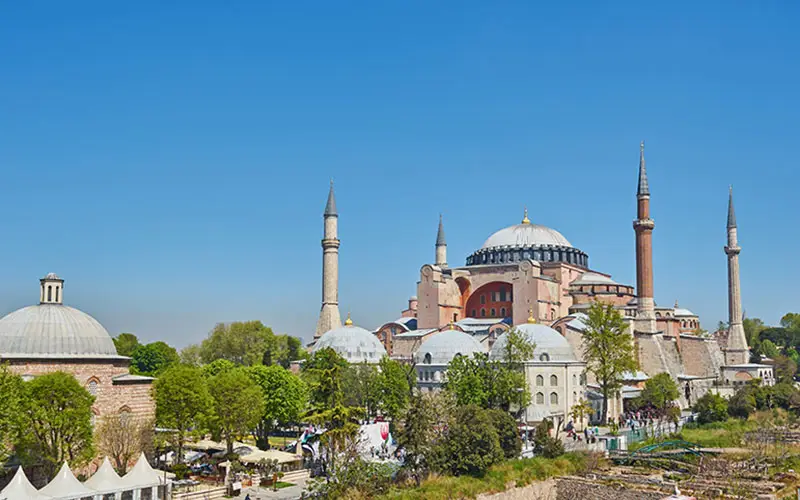Best Time to Visit Turkey: A Complete Guide
Turkey is a wonderful land of nice culture, warm generosity, deep history, and awe-inspiring landscapes. Be it shopping at Istanbul’s eventful bazaars, surveying primeval ruins, or sunbathing on the magnificent Mediterranean coast, timing the visit appropriately can redefine one’s experience. This all-inclusive handbook will assist one to opt for the suggestive best time to visit Turkey resting on their distinctive interests and trip preferences.
Turkey’s Climate- an Outline

Owing to its vast geography, Turkey is blessed with a diverse climate. The Mediterranean & Aegean coasts enjoy dry, hot summer months and wet, mild winters. It is the Black Sea area that stays humid all year having moderate conditions while central Anatolia possesses a continental climate having snowy winters and balmy summers. This assortment makes the country a year-round site.
Turkey- Convincing Reasons for a Visit
- Beautiful Culture & Deep History: People can survey distinguished historical places in Turkey from Pergamon to Ephesus and Troy, to many more. Other highlights comprises Istanbul’s celebrated spots, eventful bazaars, and wonderful cultures aptly merging Asian & European heritage across different centuries of enthralling history,
- Natural Beauty: Uncover unmatched tourist attractions in Turkey right from striking Mediterranean & Aegean beaches, Lycian Way & Pontic Mountains’ excellent trails, and Cappadocia’s exclusive landscapes.
- Warm Hospitality & First-Rate Food: Sample delectable Turkish gastronomy with fresh seafood to tasty kebabs and rich flavors, while relishing the warm generosity of its affable people.
- Activities and Adventure: Indulge in the delight of trekking to paragliding and the charismatic Turkish Riviera, followed by diving into Turkey’s vivid culture of local markets/bazaars.
Visiting Turkey- Seasonal Classification

When precisely is the recommended best season to visit Turkey? Let’s uncover deeper,
- Spring: Spanning March up to May, spring is a favorable visiting time. The idyllic merge of thinner crowds, budding landscapes, and mild conditions makes it just right to stopover places as Cappadocia and Ephesus. Besides, spring also qualifies amid the suggested best time to visit Turkey Istanbul. While occasional showers take place, the vibrant scenery coupled with pleasant climate present a comforting and delightful experience.
Temperature/Weather: 10°C up to 20°C/occasional rainfall & sunny days
Spring Highlights: Hot air ballooning, sightseeing, Tulip Festival, hiking, nature walks
Spring Specialties: Ideal time both for botany admirers and photographers, fresh seasonal produce namely artichokes, asparagus, strawberries
- Summer: Spanning June up to August, Turkey’s summer is sunny and scorching, just right to survey celebrated beaches in Turkey. Coastal cities chiefly Antalya and Bodrum remain eventful presenting lively resorts and pretty beaches. Summers are also apt for stopping over Ephesus or Troy. Do not fret the burning heat outdoors, as there are ample relaxing indoor activities.
Temperature/Weather: 20°C up to 30°C/hot days and scanty showers
Summer Highlights: Turkey in July & August is apt for beach & water sports, paragliding, and seasonal open-air concerts
Summer Specialties: Turkish lemonade, dondurma (ice cream), summer fruits- watermelons, peaches, and cherries, and fresh mezes
- Autumn: Spanning Turkey in September up to November, autumn presents sparser crowds, vivid landscapes, and mild conditions. This season is just right for hiking in Cappadocia, sightseeing, and relishing fresh local produce in the course of the harvest season. Though occasional showers is likely to take place, the atmosphere overall is charming and composed, qualifying the autumn season as the recommended best month to visit Turkey for exploring its historic charisma and natural splendor.
Temperature/Weather: Mid-10s up to mid-20s Celsius/low humidity and mix of rain & sun
Autumn Highlights: Wine tasting, hiking, cultural exploration, surveying historical sites
Autumn Specialties: Idyllic light for painters & artists, gorgeous landscapes for proper romantic escapes, seasonal delicacies as pumpkin dessert & roasted chestnuts
- Winter: Spanning December up to February, winters transform Turkey into a delightful wonderland. Ski resorts & hot air balloons add to the charisma while Cappadocia & Pamukkale’s snow-heaped landscapes present dreamy views. With economical prices and sparser tourists, these months are peaceful for surveying historical sites. Do pack warmly for Turkey’s frosty climate.
Temperature/Weather: Below-freezing up to 10°C/sun, wind, rain and snow with storms on the coast
Winter Highlights: Thermal spas, skiing, museum hopping and Datça Almond Blossom Festival taking place in Turkey in February
Winter Specialties: Winter comfort delicacies as Turkish stews, kunefe, lentil soup, and lower prices
Turkey Beaches- When to Visit

For a comforting beach break, the suggestive best time to travel to Turkey spans May up to September. In fact the Turkish Riviera (Fethiye, Antalya, Marmaris, Bodrum) presents warm sea temperatures and sunny climate. The hottest months happen to be July & August just apt for water sports & swimming, whereas June or even September is idyllic for thinner crowds.
Turkey’s Historical Sites & Sightseeing- When to Visit

When is the best time to visit Turkey specifically for stopping over at historical sites and also sightseeing? Well, it is predominantly spring (April until June) as well as autumn (September until November). Both the seasons feature sparser crowds, mild conditions, and idyllic climate for uncovering sites as Ephesus to Hagia Sophia. Take pleasure of prospective travel discounts, season-specific cultural festivals, and comforting outdoor walks, everything while evading the winter chill and unkind summer heat for an at-ease experience.
When in Turkey is its Off-Season?
In Turkey, the off-season spans November until March, presenting economical travel costs and thinner crowds. Inland areas are likely to be snowy and cold while coastal regions remain mild. This period is just right for people who fancy a relaxed, quieter experience and those on a definite budget.
How Many Days will be Enough for a Turkey Trip?
For surveying Turkey comfortably, 7-10 days is just right. A shorter tour of 5-6 days will be apt for Istanbul, yet for those stopping over numerous regions from Pamukkale to Antalya and also Cappadocia, it is suggestive to aim for 10-15 days for that fuller experience.
Turkey’s Year Round Festivals and Events
- January: New Year, Selcuk Camel Wrestling
- February: Datça Almond Blossom Festival
- March: Ramadan, Mesir Paste Festival
- April: Istanbul Film Festival, National Sovereignty & Children’s Day, Istanbul Tulip Festival
- May: Labor Day, Hıdrellez
- June: Istanbul Music Festival, Kurban Bayrami
- July: Kırkpınar Oil Wrestling Championships, Aspendos International Opera & Ballet Festival
- August: Victory Day, Cappadocia Balloon Festival
- September: İzmir International Fair
- October: Republic Day
- November: Istanbul Theatre Festival
- December: Mevlana Festival
Season-Based Travel Tips
Spring
- Pack a thin raincoat and layers for sudden climatic alterations
- Reserve stay places beforehand for spring & Easter
Summer
- Remain aptly hydrated, carry a hat, and sun lotion
- Book coastal resorts early
- Put on airy clothing
Autumn
- Carry robust and relaxed footwear for hiking
- Pack a thin jacket more so for breezy evenings
- Relish local gastronomy & harvest festival
Winter
- Bring warm attires for eastern & central Turkey
- Grab outstanding off-seasonal tour & accommodation deals
Turkey Travel Requirements
For touring Turkey, people typically necessitate a visa-a sticker or e-visa. Besides, specific requisites comprise evidence of onward travel, legitimate passport, passport photos, travel insurance, evidence of funds, accommodation proof, and other paper work resting on the definitive visa type.
Who Necessitates a Visa for Turkey Visit?
Northern Cyprus nationals and people possessing a Turkish passport do not necessitate a visa. Nationals falling under 79 countries comprising Singapore to Japan, and France, amid others can get into the country visa-free spanning 30/60/90 days specifically for business/tourism. It is obligatory for others to apply for Turkey tourist visa, having needs changing via nationality. Review current visa rules at all times earlier than traveling.
Conclusion
Turkey is an all-season getaway, with each presenting something of its kind. From comforting summer beaches, blossoming spring tulips, cozy winter cafes to autumn hikes, each moment is absolutely delightful. The idyllic best time to visit Istanbul or other Turkey wonders rests on the traveler’s definite budget, travel style, and preference for climate. Hope this all-inclusive guide assists you to map the perfect Turkey trip.
FAQs
Q1. What is Turkey’s Prime Vacation Period?
September- November along with April-May for its temperate climate qualifies as Turkey best time to visit
Q2. Which months in Turkey is the most economical?
November until March, the low season is the most economical but crowds do gather during the commencement of ski season during December.
Q3. List Turkey’s Finest Cities to Stopover.
- Istanbul for its effervescent street life, deep history, and striking architecture
- Antalya for its primeval ruins and pretty beaches
- Cappadocia for its hot air balloon flight and exclusive rock formations
- Bodrum for its yacht-filled marina and pulsating nightlife
- Izmir for its delectable cuisine and profound heritage
Q4. List Turkey’s seasonal special delicacies.
With regards to delicacies, what is the best time to visit Turkey? Well, each month has its specialty.
- Summer: Fresh seafood, lemonade, ayran, grilled meats
- Autumn: Vegetable stews, pumpkin soup, roasted chestnuts, apple & Turkish tea
- Winter: Stuffed dried fruits, baklava, lentil soup, lamb stew
Q5. List Turkey’s Significant Festivals
- Istanbul Film Festival
- Cappadocia Balloon Festival
- Istanbul Tulip Festival
- Selcuk Camel Wrestling
- Izmir International Fair



